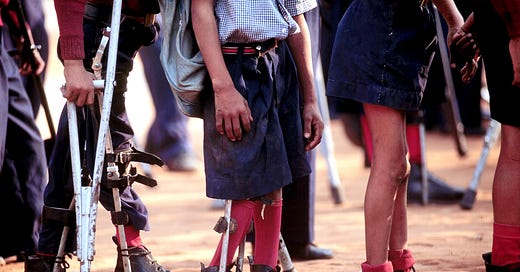The "SOME PEOPLE" Essays
The Harm of Health Illiteracy: When We Decide Not to Vaccinate Our Children Here, We Endanger the Lives of Children the World Over by Jean-Marc Giboux | Edited by Kimberly J. Soenen
(The legs of children and a child in wheelchair impacted suffering impact of polio: New Dehli, India, February 19, 2004. Photo by Jean-Marc Giboux.)
For more than 20 years, I reported on healthcare, Public Health, and Human Rights issues around the world. Polio eradication was one of the issues I covered over the long term.
Many people who grew up in Canada and the United States after the measles vaccine was introduced in 1963 didn’t have to be concerned about contracting measles and other illnesses that ravaged earlier generations.
In 1978, federal health officials in the United States set their sights on eliminating the measles virus entirely. Later, efforts ramped up worldwide to eradicate polio. In 1988, the World Health Organization (WHO)—160 countries—adopted a resolution for the eradication of polio. Because the polio virus resides solely in humans, a vaccine was developed and made available globally.
As more and more people were immunized, measles cases plummeted. By 2000, the US was declared "measles-free.” After the polio vaccine was developed, thirty years later, polio virus cases have decreased by more than 99%.
But failure to eradicate polio from these last remaining strongholds could result in as many as 200,000 new cases every year worldwide. As long as one child remains infected, children in all countries are at risk of contracting polio. That is, until recently in North America.
The Anti-Vaccination movement is based on pseudoscience and/or religious beliefs that question the benefits of vaccines. In the fall of 2019, the Centers for Disease Control and Prevention (CDC) recorded more than 1,200 measles cases in the United States—the largest number of cases on record since 1992. The United is not the only country where measles is now surging. The United Kingdom, Greece, and Brazil are also experiencing a dangerous uptick in the number of cases. Before the measles vaccine was introduced, the United States had about four million cases with an estimated 48,000 hospitalizations and 500 deaths every year. Measles was also a leading killer of children globally.
Because of isolation, neglect, civil strife, and war, eradicating disease in many of the poorest at-risk populations around the world is challenging. Many in those regions have no access to quality healthcare. But refusing vaccinations in North America?
Why?
“Now, the most notable opponents of Mr. Kennedy were pediatricians on the front lines of our children’s health who regularly have to combat misinformation; combating vaccine skepticism with correct information—correct information that comes from their education, training and experience as physicians. They are aware of the falling vaccine rates and the inevitability of increasing hospitalizations and deaths of children from vaccine-preventable diseases. They are aware that children are now contracting diseases that they would not have contracted if the children were vaccinated.”
—Excerpt from U.S. Senator Bill Cassidy, M.D. (R-LA) on the U.S. Senate floor speech in support of Robert F. Kennedy, Jr. to become Health and Human Services Secretary | February 4, 2025
People in the Anti-Vaccination movement who actively campaign against mandatory immunizations concern me because I've witnessed, firsthand, the impact vaccinations have in preventing disability and death. Now, decades later, as I monitor the measles outbreaks across the United States, I worry.
As of this writing, a total of 1,024 confirmed measles cases have been reported by 31 jurisdictions: Alaska, Arkansas, California, Colorado, Florida, Georgia, Hawaii, Illinois, Indiana, Kansas, Kentucky, Louisiana, Maryland, Michigan, Minnesota, Missouri, Montana, New Jersey, New Mexico, New York City, New York State, North Dakota, Ohio, Oklahoma, Pennsylvania, Rhode Island, Tennessee, Texas, Vermont, Virginia, and Washington. There have been 14 confirmed outbreaks—defined as 3 or more related cases. It is now spreading in Mexico and Canada, well.
Viruses travel as fast as humans do, and measles is an extremely serious disease, which can be easily prevented when people have access to a quality healthcare system. Science Denial, Health Illiteracy, incompetence at the highest levels of the United States government, citizen opposition to immunizations and vaccinations, and religious exemptions are putting us all at risk.
One thing I’ve learned over three decades of reporting: What happens in the United States impacts the Pashtun region. What happens in the Pashtun region impacts Niger. We are all interconnected. When we decide not to vaccinate our children here, we endanger the lives of children the world over.
ABOUT
Born and raised near Paris, France, Jean-Marc Giboux’s photography career started in Los Angeles covering news, social issues and cultural trends for United States and European publications. His work has been widely published by magazines worldwide, and exhibited in Museums and Art Galleries. His ten-year long photographic coverage of the worldwide drive to eradicate Polio was exhibited at the Smithsonian Museum of American History in Washington, D.C. His photography exhibition “Sacred Waters” was inaugurated at the Field Museum of Natural History in Chicago, a photographic documentary on the largest pilgrimage on the planet, 12 years in the making.
Giboux is currently based in Chicago and shoots features and portraiture for editorial and corporate clients, complementing his passion for long form documentaries with video recording and editing. Editorial clients include Business Week, Time Magazine, Newsweek, New York Times Magazine, Wall Street Journal, Spiegel, Smithsonian, Stern, Paris-Match, Mediapart, Grands Reportages, Discovery Channel, Bon Appetit, The Guardian and the Sunday Times of London.
ADDITIONAL RESOURCES
THE FINE PRINT Health Humanities Magazine | Interview with Jean-Marc Giboux March 24, 2024
NEW CITY | The Very Real Fact of Polio: A Review of Jean-Marc Giboux at Chicago Center for Photojournalism May 10, 2024
Learn more at “SOME PEOPLE”





